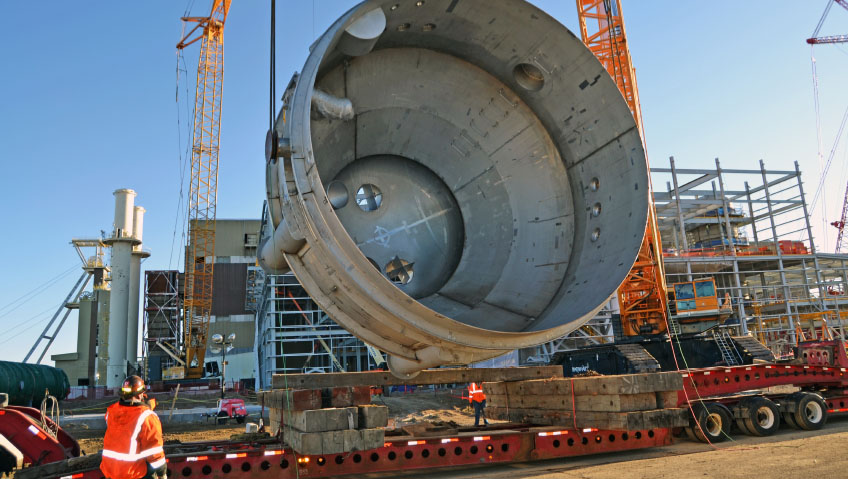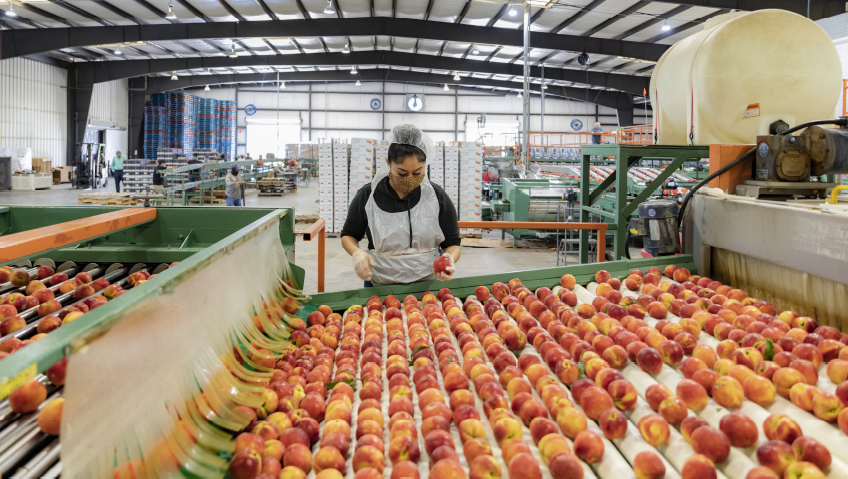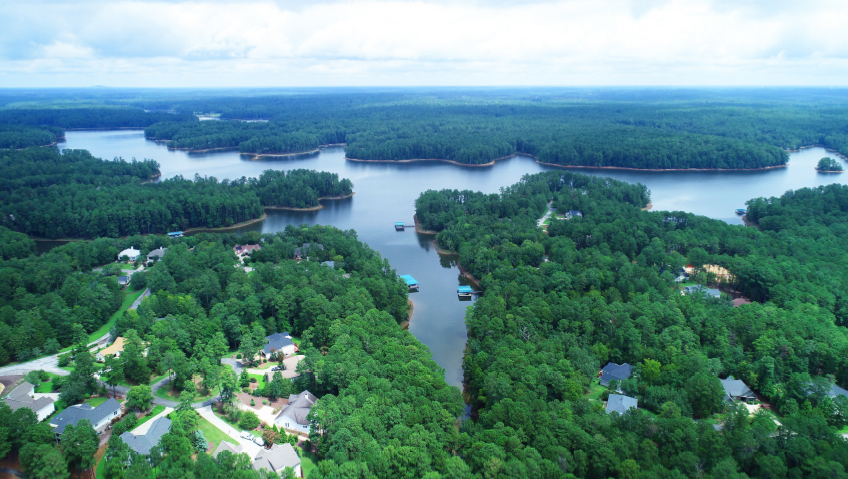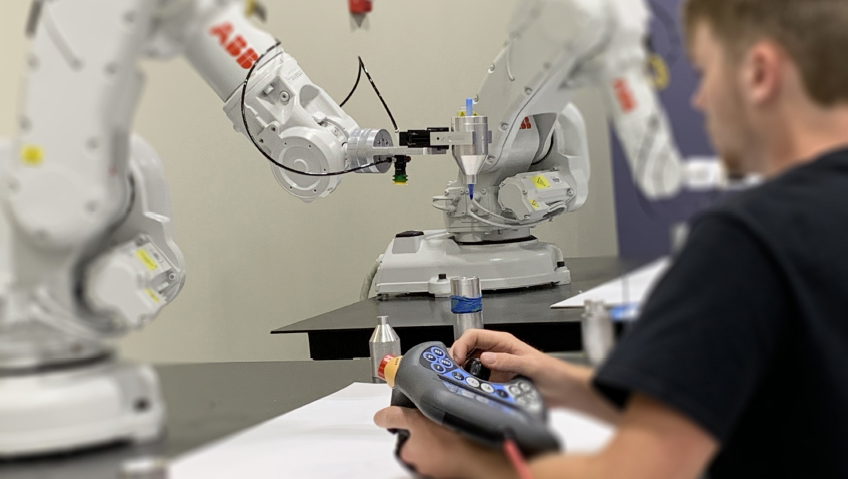Sweetwater County is bustling with activity. Home to major mining and industrial development projects, the Wyoming community is moving forward to embrace new economic opportunities. After profiling Sweetwater County in 2019, Business in Focus checked back in to hear the latest on a range of projects.
Sweetwater County is home to the largest natural soda ash mine and production site on the planet. Operated by Genesis Alkali, the site is one the few in the world to produce soda ash naturally. “The rest of the world produces it through a chemical process,” explains David Caplan, Director of Communications for Genesis Alkali. He adds that the soda ash produced in Sweetwater County is “much more environmentally friendly,” because “we don’t use nearly the energy that the synthetic method involves.”
Soda ash, derived from trona, is a necessary ingredient in glass production, making Sweetwater County’s trona mines critical to the global glass supply. “About fifty percent of all the soda ash we make ends up going to glass makers all around the world,” Caplan says of the Genesis Alkali site. “They [use it to] make all kinds of glass—for car windshields, for buildings, for bottles, anything you can imagine that’s made out of glass. [Soda ash is] a very necessary ingredient in today’s world because we couldn’t survive without glass for very long.”
Genesis Alkali is currently expanding its Granger facility to create a next-generation mining operation that will utilize special technology created and patented by the company. The expansion will boost the community economically “in a time when we really need it, particularly in Wyoming with the coal industry really dissipating,” says Joe Vasco, Venture Manager for the $350 million project.
The construction phase will continue into 2023 and create approximately 350 jobs. “Having that many folks working here in Sweetwater County, obviously, that’s a huge economic impact,” Vasco points out. “They live here, so you know they’re spending the dollars here, so they’re boosting the economy here.” Once the facility is fully expanded, the site will employ around 125 permanent employees. “Those are fulltime, good jobs for this area,” Vasco says. “That’s a boost to the county and, really, the state of Wyoming.”
The company’s new technology will dissolve and pump trona to the surface, instead of having to send workers underground to mine it. “This site will be completely solution-fed,” Vasco says. “There’re no folks underground. 1.3 million tons would come strictly from solution processing technology that we created and patented.”
Caplan adds that, “If we look out into the future—twenty, fifty years from now, a hundred years from now—making soda ash this way with the water we pump down into these underground mines with no miners underground anymore—that really is the wave of the future. That’s how soda ash will be made decades from now, and we’re doing it right now. We’re pioneering this technology.”
The advantage is economic. “You take away a lot of the fixed costs and variable costs associated with hard-rock mining,” Vasco says. “You trade it for pumping costs, which is more cost-effective. At the end of the day, [it] is a very cost-competitive business that will be here for the long haul.”
Genesis Alkali is not the only operation that sees big potential in Sweetwater County’s trona deposits. The Pacific and Atlantic Soda Company is currently in the proposal phase of developing a trona facility in Sweetwater County. Ciner’s trona mine has recently been approved for a major expansion and construction is slated to begin in the near future.
In addition, Sweetwater County’s airport is undergoing renovations, making travel in and out of the area easier for people looking to do business here.
Sweetwater County managed to overcome the pandemic’s economic challenges by coming together as a community. “We’re very resilient here,” says Kayla McDonald, economic development specialist of the Sweetwater EDC. “We’re very community-focused. When businesses were struggling, everybody rallied together to support one another. We had several businesses that were facing critical shutdown—small businesses—and the community supported them to help them get through.”
McDonald goes on to explain that COVID “taught our community to be more proactive in working together and finding that synergy,” and that Sweetwater County has become “very self-sufficient.” For example, the county embraced a diversification initiative originally proposed by the state of Wyoming and took it to the next level. “They identified sites within the state that would be energy hubs or innovation areas, and Sweetwater County took that initiative, and we started doing our own research and identified our own sites,” McDonald says.
As a result, the county is now on phase two of the development of thousands of acres located near the airport on Middle Baxter Road. Currently, Sweetwater County is seeking a state grant for a feasibility study to determine the site’s potential as a renewable energy hub for the region. The next step in the process will include looking at partnerships with companies in target industries.
Sweetwater County recently submitted a proposal for the chance to locate the State of Wyoming’s first nuclear reactor project. In November, TerraPower announced Kemmerer, Wyoming as the preferred site for the Natrium™ reactor demonstration project, which is a TerraPower and GE-Hitachi technology, and is one of two competitively-selected advanced reactor demonstration projects (ARDP) supported by the U.S. Department of Energy (DOE). Sweetwater County will be a key component to this project announcement with Kemmerer being located in Lincoln County, which is about an hour away from Sweetwater County.
McDonald says, “We expect to see some economic impact from this project once it is operational. We also believe that our skilled workforce will be instrumental in aiding in filling jobs and skills needed to help fill the employment gaps.”
Sweetwater County’s potential for attracting new projects goes far beyond nuclear power due to its skilled, qualified workers. “We have a strong workforce,” says Eric Bingham, Land Use Director for the Sweetwater EDC. “They could move into a manufacturing-type facility with the skills that they have here locally. That’s always the key with business attraction and development.”
Western Wyoming Community College is particularly focused on workforce training and development. “Our community college is right in the top ten in the nation in community colleges,” McDonald says. “They actually have industry programs… They have onsite training for anybody. So if you’re working in the trona mine or in the coalmine and you need additional education, our community college partners with existing industry to get their employees educated, to go through the proper training.”
Additionally, the Southwest Manufacturing Partnership, established in 2018 by the mining industry and other partners, offers a certificate program through the community college “to help the pipeline of operators through the different mines around here,” McDonald says. “So basically, it’s one certificate, and those students that go through that training are a hundred percent placed within one of those industries. So they can get hired on immediately at a trona [facility] or out at our phosphate plant and immediately can start with a ninety-day probationary period with an option to hire… Our college is very apt to assist wherever industry needs, and that’s their direction going forward—to help grow those programs so if we do need to quickly turn around training times for any kind of a future industry and diversification, then we have that ability.”
Sweetwater County is eager to keep moving forward to ensure a prosperous future for the entire community. “We’re learning to be very proactive and not just wait for the next big thing to happen,” McDonald says. “We actually want to lead it.”






